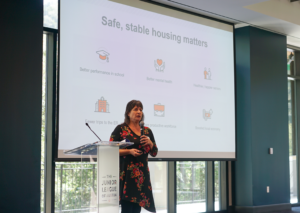On April 8, a group of local funders and community leaders gathered to discuss how philanthropy can meaningfully engage in achievable, scalable solutions for affordable housing in Central Texas. Hosted by Austin Community Foundation, St. David’s Foundation and the Still Water Foundation, the convening was the first step toward galvanizing conversations and ideas amongst philanthropic colleagues concerned with the escalating impacts of the region’s housing crisis.
The event included a presentation by Jake Wegmann, associate professor and program director for Community and Regional Planning at The University of Texas at Austin’s School of Architecture. Wegmann provided context on the local housing trends and factors contributing to the issue, including the unique challenges and opportunities for making headway on housing affordability.

To shed light on how philanthropy can play a role in addressing the housing crisis, Cassandra Benjamin, principal at csb philanthropic solutions, provided an overview and recommendations from a new report, Producing, Protecting & Preserving Housing Affordability in Central Texas. The report, commissioned by Austin Community Foundation in partnership with JPMorgan Chase & Co., NI, and St. David’s Foundation, calls attention to the need for philanthropic investment in housing affordability and outlines potential funding strategies.
The remainder of the event centered on a panel discussion exploring local solutions to affordable housing from various perspectives in the community. Panelists included Julian Huerta, VP of Community Programs, St. David’s Foundation; Coralie Pledger, CFO, Austin Community Foundation; Yvette Ruiz, Executive Director, Community Engagement, JP Morgan Chase & Co.; and Wegmann.
5 key takeaways from the event:
- Despite the affordable housing challenges our region faces, Central Texas has many strengths and opportunities to address this issue. The region has few geographic barriers to urbanization, the ability to produce a great deal of housing during a boom, increasing political will to fund affordable housing, and excellent nonprofits working to provide housing and supportive services.
- Philanthropy has an important role in solutions for affordable housing. No matter a foundation’s or corporate funder’s focus area or financial capacity, investment in affordable housing is on strategy because it’s interconnected to the overall wellbeing of a community. The philanthropic sector recognizes that without safe, stable, and affordable housing, communities are unable to thrive. “Philanthropy is flexible, fast, nimble, and can take risks. Philanthropy has the means to make an impact in affordable housing,” Benjamin said.
- To ensure “all kinds of homes for all kinds of people in all parts of town” the region must protect, preserve and produce affordable housing in concert. Pursuing only one or two of these areas will not solve the affordability crisis and can unintentionally lead to less housing.
- Innovation is key! Traditional grantmaking can only go so far. That’s why foundations, here in Central Texas and across the country, are also making program-related investments, such as financing to increase the capacity of housing-focused organizations or loans for predevelopment capital. “And while philanthropy alone cannot resolve this issue, philanthropy can be the innovative engine for ideas and commitments that can be scaled up to an effective, comprehensive, cohesive, and collaborative community effort,” Edward Burger, president and CEO, St. David’s Foundation, said.
- Collaboration is central to maximizing impact. Partnerships across sectors allow philanthropy, government, and the private industry to leverage each other’s strengths in order to exercise influence, build deeper capacity and increase resources for implementing solutions. One opportunity for collaboration is the new chapter of the Asset Funder’s Network that is being established in Central Texas. This group will be a powerful tool for leading funder collaboratives around the big issues facing our community.
Bonus: There is an exciting, shovel-ready project in the works that can be scaled and replicated. Austin Community Foundation is in the midst of a funder collaborative in support of Austin Habitat for Humanity’s three new housing developments. A joint $4 million investment over 24 months will accelerate the production of 150 homes available for purchase to families making 60-120% of the area median income. Interested in joining this effort? Email me to learn more.